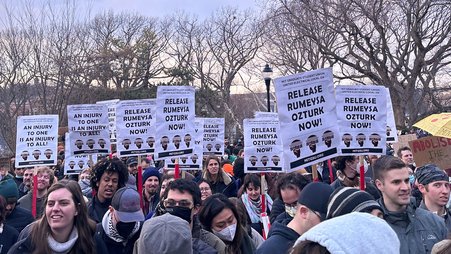We’ve said before that Israel’s assaults on Al Jazeera provide a real-time illustration of the dangers of the U.S.'s TikTok ban legislation and the power it gifts the government to muzzle its critics by invoking vague security threats.
Now Israel has escalated its efforts to silence Al Jazeera, raiding its newsroom in the West Bank and ordering it closed for 45 days. At the same time, the U.S. has expanded its targeting of foreign-owned platforms beyond TikTok, taking aim at Russian state media outlet RT with investigations and sanctions.
TikTok is not the same as RT — the latter is a state-owned media outlet that broadcasts Russian propaganda every day, while the former is a privately owned social media platform that China might or might not use to propagandize Americans.
But all three of these crackdowns — on TikTok, Al Jazeera, and RT — share two things in common. One, their proponents justify censorship by citing national security concerns stemming from the platforms’ alleged collaboration with adversaries, whether China, Hamas, or the Kremlin. Two, they cite no specifics, apparently hoping people will take for granted that their governments are cracking down on dissent with their interests in mind.
Israel sets a low bar
Any credibility Israel had when it comes to Al Jazeera (and it had very little) has unraveled since it first banned the network in May.
Its raid on The Associated Press the following month, based on the AP having sold pictures to Al Jazeera (as well as to thousands of other clients), clearly had nothing to do with Hamas or any other supposed national security concerns unique to Al Jazeera.
And any excuse for Israel’s latest raid on Al Jazeera’s Ramallah office was undermined when soldiers tore down the newsroom’s images of perhaps its best-known reporter, Shireen Abu Akleh. She’s the Al Jazeera journalist Israel previously apologized for killing in 2022 (although it still denies targeting her, despite investigations suggesting otherwise).
And it’s not as if Israel has limited its attacks on the press to Qatari-funded outlets like Al Jazeera. Its communications minister even tried sanctioning Israel’s own oldest newspaper, Haaretz, for criticizing the same war that Israelis themselves now protest en masse.
U.S. intentions in doubt
The U.S. has not raised any serious concerns about its close ally’s actions with respect to Al Jazeera (or any of its other press freedom violations, for that matter, from killing journalists to excluding them from the Gaza Strip). In fact, U.S. officials have themselves reportedly pressured Al Jazeera to soften its coverage of Israel.
So why should Americans believe that their government’s plans to ban TikTok, or, for that matter, to sanction RT, are any better intentioned or better supported by the facts?
On paper, the legislation authorizing the TikTok ban is, in many ways, worse than the Israeli law authorizing the Al Jazeera ban — at least Israel’s law requires the prime minister to obtain approval from the security cabinet or the government before any specific outlet is banned.
And our government has hardly articulated any stronger justification for banning TikTok than Israel has for banning Al Jazeera. The focus has been on things TikTok hypothetically could do — spy on or propagandize Americans — rather than anything it actually does.
But censorship in the name of national security, if it’s ever permitted at all, requires a concrete, imminent and severe threat — not the mere prospect of one. The government has not alleged — let alone proven — a threat from TikTok anywhere near as serious as the parade of horribles it claimed would unfold if the Pentagon Papers were released. Of course, the Supreme Court rejected those claims, the papers were published, and the sky didn’t fall.
The right to consume propaganda
The same goes for RT. We’re certainly not here to defend RT’s journalistic integrity (or lack thereof). But the First Amendment protects Americans’ right to consume foreign propaganda if they so choose. And that right is not dependent on whether the propaganda comes from an adversary or an ally.
As the Supreme Court said in 1945 — not a time when our government was unconcerned about foreign propaganda — the First Amendment “rests on the assumption that the widest possible dissemination of information from diverse and antagonistic sources is essential to the welfare of the public.”
Lauren Harper, our Daniel Ellsberg chair on government secrecy, wrote last week that the government has selectively declassified its conclusions about the threats posed by RT but not the underlying documents that might (or might not) substantiate them, and might (or might not) mitigate First Amendment concerns about sanctioning a news outlet for its content.
Why should Americans take officials at their word that the investigation is about anything more sinister than the network’s spreading of Kremlin propaganda?
They shouldn’t, especially when the same government asking for their trust says nothing as its ally abuses similar authority in plain sight to retaliate against journalists who criticize it.




